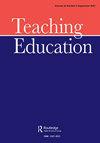关于教师教育多样性的教学和学习中的移情的批判性想象
IF 1.1
Q2 EDUCATION & EDUCATIONAL RESEARCH
引用次数: 9
摘要
摘要:“困难”或潜在的令人不安的多样性主题和批判性的、令人不安教学法在教师教育环境中往往会引发“无关”的抵制或指责。在这些主题和教学法的教学中,通常非常强调培养和利用同理心过程,以富有成效的方式改变态度,减少社会不公正现象。从爱尔兰学校的三项定性研究中挑选了一些说明性的叙述,与媒体评论和一些个人的催化思考交织在一起,本文探讨了(a)在教师教育中,对移情的强调是如何不受其限制和限制的;(b)将移情置于一种奇怪的情感教育中所产生的生成可能性。本文对移情在性别和性多样性教学背景下的局限性的密切关注和说明,开启了在酷儿情感教育学中对移情的新思考,并考虑到这对教师教育中的多样性教学的更广泛潜力。最终,本文提出了一个论点,即在这种关注可以产生新的教学想象和可能性的前提下,我们如何应对教师教育中的多样性困境。本文章由计算机程序翻译,如有差异,请以英文原文为准。
Critical imaginaries of empathy in teaching and learning about diversity in teacher education
ABSTRACT ‘Difficult’ or potentially discomforting diversity topics and critical, unsettling pedagogies often induce resistances or charges of ‘irrelevance’ in teacher education contexts. In teaching with these topics and pedagogies, there is often a significant emphasis on fostering and utilising the process of empathy in productive ways to change attitudes and reduce social injustices. Drawing on a selection of illustrative accounts from three qualitative studies in schools in Ireland, interwoven with media commentary and some personal catalytic reflections, this paper explores (a) how an emphasis on empathy is not without its limits and restrictive effects in teacher education and (b) the generative possibilities yielded by situating empathy within a queer pedagogy of emotion. This paper’s close attention to and illustration of the limits of empathy within the context of teaching about gender and sexuality diversity opens a new consideration of empathy within a queer pedagogy of emotion and considers the broader potential of this for teaching about diversity in teacher education. Ultimately, this paper advances an argument for a constant watchfulness about how we are responding to diversity dilemmas in teacher education on the premise that such attention can yield new pedagogical imaginaries and possibilities.
求助全文
通过发布文献求助,成功后即可免费获取论文全文。
去求助
来源期刊

Teaching Education
EDUCATION & EDUCATIONAL RESEARCH-
CiteScore
3.80
自引率
6.20%
发文量
15
期刊介绍:
Teaching Education is an interdisciplinary forum for innovative practices and research in teacher education. Submission of manuscripts from educational researchers, teacher educators and practicing teachers is encouraged. Contributions are invited which address social and cultural, practical and theoretical aspects of teacher education in university-, college-, and school-based contexts. The journal’s focus is on the challenges and possibilities of rapid social and cultural change for teacher education and, more broadly, for the transformation of education. These challenges include: the impact of new cultures and globalisation on curriculum and pedagogy; new collaborations and partnerships between universities, schools and other social service agencies; the consequences of new community and family configurations for teachers’ work; generational and cultural change in schools and teacher education institutions; new technologies and education; and the impact of higher education policy and funding on teacher education. Manuscripts addressing critical and theory-based research or scholarly reflections and debate on contemporary issues related to teacher education, will be considered. Papers should attempt to present research, innovative theoretical and/or practical insights in relevant current literature and debate.
 求助内容:
求助内容: 应助结果提醒方式:
应助结果提醒方式:


